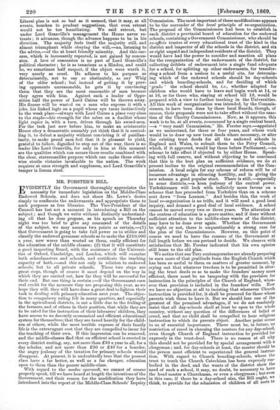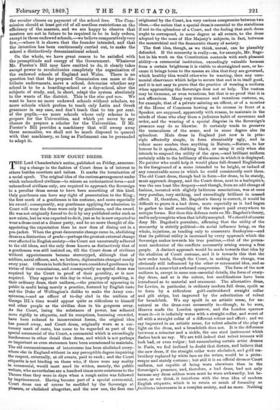MR. FORSTER'S BILL. MR. FORSTER'S BILL. E VIDENTLY the Government thoroughly
appreciates the necessity for immediate legislation on the Middle-Class Endowed Schools, and does not share Mr. Lowe's desire simply to confiscate the endowments and appropriate them to such purposes as free libraries. The Vice-President of the Council has lost not a moment in introducing a Bill on the subject ; and though we write without distinctly understanding all that he does propose, as his speech on Thursday night was too brief to give any command of the details of the subject, we may assume two points as certain,—(1) that Government is going to take full power so to utilize and classify the endowed grammar schools as to make the £210,000 a year, now worse than wasted on them, really efficient for the education of the middle classes; (2) that it will constitute a good inspecting Board, with the assistance of the Universities of Oxford, Cambridge, and London, which will examine both schoolmasters and schools, and certificate the teaching capacity of both,—and this not only in relation to endowed schools, but to all private schools. These two steps are great steps, though of course it must depend on the way in which they are carried out, how far they will be successful for their end. But one thing is certain ;—if the Government earn real credit for the measure they are proposing this year, as we hope they will, they will have done a great deal to lighten their task in dealing with primary education next year. The objection to compulsory rating felt in many quarters, and especially in the agricultural districts, is not a little due to the feeling of the farmers, and of others in their position, that while they are to be rated for the instruction of their labourers' children, they have access to no decently economical and efficient educational system for themselves; that they are taxed heavily for the children of others, while the most terrible expense of their family life is the extravagant cost that they are compelled to incur for the teaching of their own. If this impression can be removed, and the middle-classes find that an efficient school is erected in every district costing, say, not more than £10 a year in all, for a day scholar, and not more than £30 or £40 for a boarder, the angry jealousy of the taxation for primary schools would disappear. At present, it is undoubtedly true that the poorest class have a far better, as well as a far cheaper, education open to them than the poorer middle-class.
With regard to the modus operandi, we cannot of course properly speak, till we have heard at length the intentions of the Government, and their reason for the modification they have introduced into the report of the Middle-Class Schools' Inquiry Commission. The most important of these modifications appears to be the surrender of the local principle of re-organization.
The proposal of the Commissioners had been to establish in each district a provincial board of education for the endowed schools, containing a Government Commissioner, who should be ex-officio trustee of every educational trust of the kind in the district and inspector of all the schools in the district, and six or eight unpaid and independent residents of the district. They would have had the power to consider and sanction all plans for the reorganization of the endowments of the district, for collecting driblets of endowment into a single fund adequate for a school, for splitting up other endowments, for transfer ring a school from a useless to a useful site, for determining which of the endowed schools should be day-schools and which boarding-schools, and for deciding of which grade ' the school should be, i.e., whether adapted for children who would have to leave and begin work at 14, or at 16, or for those who, staying at school till 18, would be prepared with a view to further teaching in the Universities. All this work of reorganization was intended, by the Commissioners, to have been done by these local Boards, though, of course, their proposals were not to take effect without the sanction of the Charity Commissioners. Now, as it appears, this work is to be, at all events, commenced by a single central board, —a "very small Commission," Mr. Forster says,—appointed as we understand, for three or four years, and whose work would be to draw up new trust deeds where necessary, or alter the existing trust deeds for all the endowed schools in England and Wales, to submit them to the Privy Council, which, if it approved, would lay them before Parliament,—no scheme to take effect if objected to by either House. Speaking with full reserve, and without objecting to be convinced that this is the best plan on sufficient evidence, we do at present incline to the original recommendation of the Commission. A local origin for any scheme of reform will be of immense advantage in silencing hostility, and in giving the new scheme a good popular start. There is still,—especially in some districts,—a keen jealousy of the central power. Yorkshiremen will look with infinitely more favour on a scheme that has proceeded from Yorkshire than on a scheme sent down "from Lannon." And besides this, the work of local re-organization is no trifle, and it will need a good local inquiry, and demand a good deal of local evidence. A school cannot be moved every two or three years. The alteration of the centres of education is a grave matter, and if done without sufficient attention to the middle-class wants of the district, may have to be done over again. Whether the Government be right or not, there is unquestionably a strong case for the plan of the Commissioners. However, on this point of course we need to have the reasons of the Government at full length before we can pretend to decide. We observe with satisfaction that Mr. Forster indicated that his own opinion still leans to the old plan. We notice that our Tory contemporaries are already preparing to earn more of that gratitude from the English Church which has been so useful to them on matters of greater moment, by crying out that whatever freedom is to be permitted in altering the trust deeds so as to make the founders' money more efficient, there must be no tampering with the provision for instruction in the principles of the Church of England, whenever that provision is included in the founders' wills. Now we have no objection at all to insisting that whenever Church instruction is provided for, it shall be procured for those whose parents wish them to have it. But we should lose one of the greatest of the promised advantages, if we do not resolutely insist that all day-schools shall at least be open to the whole country, without any question of the differences of belief or creed, and that no child shall be compelled to hear religious instruction to which its parents object. Another point seems to us of essential importance. There must be, in future, no restriction of creed in choosing the masters for any day-school, even though Church of England instruction be provided for expressly in the trust-deed. There is no reason at all why this should not be provided for by special arrangement with a clergyman ; and, for day-schools at least, the master should be the person most efficient to superintend the general instruction. With regard to Church boarding-schools, where the trust to teach the Church Catechism has been expressly embodied in the deed, and the wants of the district show the need of such a school, it may, no doubt, be necessary to have the head master a Churchman, or even a clergyman ; but even in this case, if there be a day-school also, the Bill ought, we think, to provide for the admission of children of all sects to the secular classes on payment of the school fees. The Commission should at least get rid of all needless restrictions on the efficiency of the masters, and we are happy to observe that masters are not in future to be required to be in holy orders, except in those endowed schools,—we believe comparatively very few,—where it is shown that the founder intended, and that the intention has been continuously carried out, to make the school a distinctively denominational school.
On the whole, we have great reason to be satisfied with the promptitude and energy of the Government. Whatever Mr. Forster's Bill may have omitted to do, it clearly takes enough power to revolutionize completely the organization of the endowed schools of England and Wales. There is no question but that the proposed Commission can mass or distribute endowments, move a school, determine whether any school is to be a boarding-school or a day-school, alter the subjects of study, and, in short, adapt the system absolutely to the wants of the district. This is the sine gad non. We want to have no more endowed schools without scholars, no more schools which profess to teach only Latin and Greek grammar in any case, and don't teach that to ten per cent. of the pupils,—no more schools whose only scheme is to prepare for the Universities, and which yet never by any chance do prepare a scholar for the Universities. If Mr. Forster's Bill provides a machinery that will sweep away these anomalies, we shall not be much disposed to quarrel with that machinery, so long as Parliament can be persuaded to adopt it.



































 Previous page
Previous page